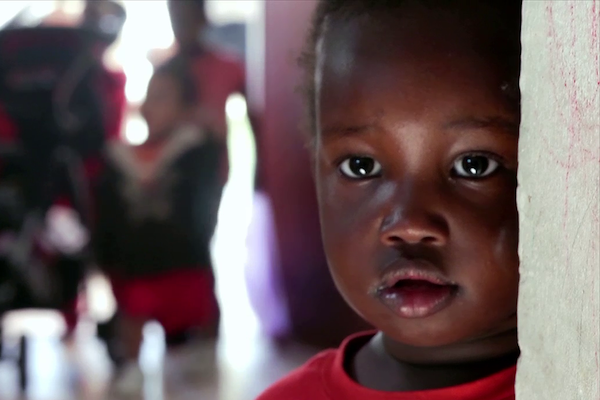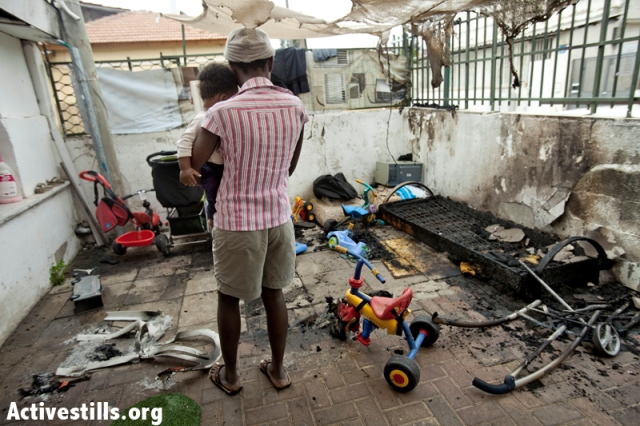A new documentary tells the story of the firebombing of a kindergarten for asylum seekers in Tel Aviv, holding up a mirror to the crucial choice Israeli society faces today.
By Roni Dorot

Roni Geffen’s short film, Divine Daycare, portrays an exercise in tribal solidarity, as well as an exercise in social solidarity beyond tribal bonds. The film follows the story of a kindergarten for refugee children in south Tel Aviv after Israelis threw six Molotov cocktails and torched it. It is deeply moving and touches raw nerves.
One might say – and justifiably so — that it is not difficult to elicit emotion when the camera focuses on a sweet, smart girl named Lula and her teacher, named Blessing, who perceives her role as far greater than just a kindergarten teacher.
Still, the film is smart because it is effective, revealing a world unknown to most Israelis — in their own backyard. And why should a film to be effective? To spur social change.
An effective documentary confronts a society with something that it prefers to ignore, raises emotions it would rather repress, and thus forces members of that society to identify with those to whom fate has been less kind. Hence its crucial importance, as well as that of the Solidarity Film Festival where the film was screened in Tel Aviv’s Cinematheque.
Sociologist Emile Durkheim argued that the origin of social solidarity in “traditional” societies lies in homogeneity of their members. Tribal resemblances, biological similarities, and a shared sense of belonging enabled individuals to organize, work towards a common interest, and care for each other. He called this “mechanical solidarity.” In contrast, according to Durkheim, modern societies, characterized by a complex division of labor, and perhaps other forms of diversity, generate a different, “organic” kind of solidarity.
How to build solidarity among different and divergent groups is one of the most crucial questions facing Israeli society today. Finding ways to look beyond the logic of tribal resemblance is fundamental to the struggle for peace and human dignity. Israeli society must find a way to generate solidarity with those marked as “others” who live within its borders.

In one of the film’s scenes, Lula asks her mother to take her home because she misses her. Normally, Lula sleeps at Blessing’s kindergarten because her mother struggles to take care of her. The kindergarten has no chairs and tables — they were burnt in the arson attack. There are roaches in the kindergarten. About six toddlers shared one mattress during the day. Sweet Lula, however, is not afraid of Molotov cocktails because “the fire can only burn chairs and toys.” Any mother who has ever carefully selected her child’s kindergarten would faint long before this — watching the scene where Blessing’s children eat overly-sugared chocolate cornflakes, without milk, from dishes on the floor.
In a contrasting scene, Geffen draws on archival footage of now-minister Miri Regev inciting local residents against Sudanese and Eritrean refugees, shouting, “the Sudanese are a cancer in our bodies.” Regev externalizes the moral choices Israeli society faces: between an open society, characterized by cross-group social and a closed, tribal society.
But there is tribe and there is tribe. There is the larger, Jewish tribe favored by Miri Regev, and there is the smaller, nuclear tribe of family, with which the director Roni Geffen comes face-to-face in the film. The kindergarten Blessing operates and the property where she lives belong to Geffen’s uncle, unbeknownst to Geffen (the film claims), and the uncle demands that Blessing leave immediately. He argues that the illegal kindergarten puts him at risk — that he’s liable for breaking the law.
But Blessing and the toddlers have nowhere to go. No one will agree to rent a house out to the kindergarten. Geffen attempts to straighten things out with her uncle, but he refuses to abandon his tribal commitments. “Roni,” he says “I will not let anyone hurt me. Nobody!” His fear of the law is justified, but what matters more is his refusal to do business with “those people.”
Dr. Roni Dorot edits ‘Documania,’ a sociological blog on documentary films at Haaretz, where an early version of this article was published.

